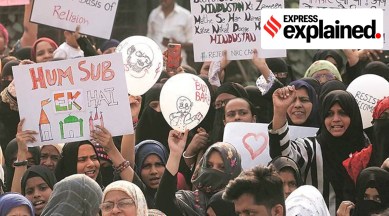Why Mumbai Police has withdrawn its case against protestors of CAA and JNU violence in Jan. 2020
The public prosecutor cited a GR from Sept 2022, and told the court that there had been no loss of life or public property, and that the alleged act was social and political in nature.

The Mumbai Police earlier this month withdrew a case filed in January 2020 against 36 persons, including activists and lawyers, for protesting against the attack on students in Jawaharlal Nehru University (JNU) in New Delhi, and also against the Citizenship (Amendment) Act (CAA).
What was the case filed by the Mumbai Police in January 2020?
Around midnight on January 5, a large group of citizens assembled at the Gateway of India, holding candles to protest the violence that had taken place against students in JNU hours earlier that same evening. The gathering was peaceful, and the citizens registered their protest against the violence, and against the CAA among other issues.
The following day, a larger crowd marched from Hutatma Chowk to the Gateway of India. Police estimated that at least 1,000 individuals had gathered at the protest, including at the Colaba police station. The Colaba police filed FIRs against a number of the protesters.
What were the charges against the protesters?
On December 28, 2020, the Colaba police filed a chargesheet against 36 persons, including senior lawyer Mihir Desai, CPI leader Prakash Reddy, and Dalit activist and balladeer Lokshahir Sambhaji Bhagat among others. On the same day, 29 of these accused appeared before the court, and were granted bail on furnishing a personal bond.
The 36 individuals referred to as participants in the protest were charged with the same sections that were mentioned in the FIR — Section 143 (member of an unlawful assembly), and Section 149 (every member of an unlawful assembly guilty of offence committed in prosecution of common object) of the Indian Penal Code, and Section 37(3) of the Bombay Police Act, 1951, that prohibits assemblies and processions.
The chargesheet claimed that the protesters did not have permission to assemble, and that the designated spot to protest was at Azad Maidan.
So what happened this month?
On January 12, the Mumbai Police through its public prosecutor, Gautam Gaikwad, filed an application seeking to withdraw and dispose of the case. The application said that the accused persons had committed the alleged act “as a protest without any personal interest or benefits”. The application cited a Government Resolution (GR) of the state Home Department dated September 20, 2022.
The application was moved by the prosecutor under Section 321 of the Criminal Procedure Code (CrPC) which gives the prosecutor power to withdraw a case with the consent of the court. The prosecutor said in the plea that he had applied his mind to the facts of the case, and had come to the conclusion that this was a fit case for withdrawal.
And what did the court say about the Mumbai Police plea?
The court of the additional metropolitan magistrate allowed the application to withdraw the case and its disposal.
The court noted that the police had contended that there had been no loss of life or public property, and that considering the allegations and facts of the case, and due to the alleged act being social and political in nature, the prosecution did not want to proceed with the matter.
Therefore, the plea was being allowed, the court said.
What does the Home Department GR cited by the Mumbai Police state?
The GR states that political parties and social organisations conducted protests in social interest and to raise awareness on various issues, and that the government has decided to withdraw cases involving such protests, where chargesheets have been filed on or before March 31, 2022.
The GR lays down certain criteria to be followed while recommending the withdrawal of such cases. There must not be any loss of lives and no damage to properties — either private or public — of value more than Rs 5 lakh.
The GR also constituted a panel to evaluate which cases could be recommended for withdrawal. In cities that have a police commissionerate (such as Mumbai), the panel will include the zonal deputy commissioner of police (DCP), zonal assistant commissioner of police (ACP) and the assistant director, Directorate of Prosecution.
In districts, the panel will comprise a sub-divisional revenue officer instead of the DCP and a sub-divisional police officer instead of the ACP.
The GR also states that cases in which the protesters include former or current MLAs and MPs cannot be withdrawn without permission from the High Court. In cases where there is loss or damage to public property valued at less than Rs 5 lakh, written consent is required to be taken from the accused on repayment before recommending withdrawal.